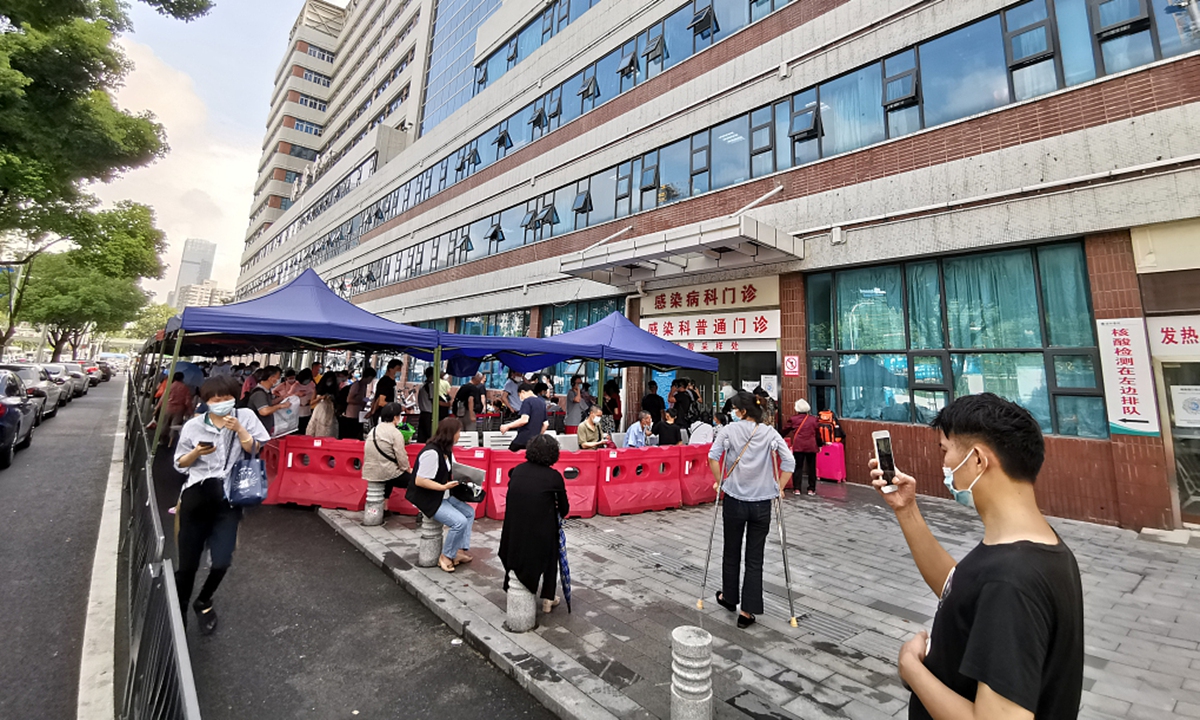
Residents line up for nucleic acid test in Wuhan. File Photo: CFP
Wuhan in Central China's Hubei Province will conduct city-wide COVID-19 testing, as the city has upgraded its epidemic response measures in the face of the recent outbreak, locking down the area where local infections were reported while upgrading its risk levels. The city's subway has adopted stricter anti-epidemic rules, and all schools have been closed.
A total of six confirmed cases and eight asymptomatic cases were reported in the latest round of infections, none of which has developed into severe cases, the provincial health commission said on Tuesday at a press briefing.
The local infections in Hubei are of the Delta variant related to the virus spread in Huai'an, East China's Jiangsu Province, authorities noted.
A Wuhan resident surnamed Xiao told the Global Times that her residential community has set up a site for nucleic acid testing this morning.
Wuhan reported seven local COVID-19 cases on Monday, breaking the zero infection record since June 2020.
A resident of Zhuankou neighborhood, who was the first case in the latest spike, transmitted the virus to six other close contacts. The community is now under lockdown and the area was upgraded to medium-risk area, the city's health commission said in a statement on Tuesday.
Another seven communities near the infected patient's workplace, a construction site in Wuhan's Jingkai district, have also been put under closed-off management. All residents living within the communities will receive nucleic acid testing, the health commission said.
All schools and tutorial institutions were asked to suspend offline classes and strengthen campus health monitoring, meanwhile speeding up the vaccination for teachers and students, local authorities said on Tuesday.
"I would give a thumb up to the government's swift response to this flare-up, very swift and efficient," Luo Ning, a Wuhan resident, told the Global Times on Tuesday, noting that Wuhan people were traumatized by the outbreak last year, and they have learned how to stay safe and protect themselves. "I believe this small flare-up won't cause too much trouble for us, but it's better to be careful," Luo said.
"Wuhan people are always on high alert of such things… The subways in Wuhan are all empty now, as if people have disappeared suddenly," a local resident surnamed Chen told the Global Times on Tuesday.
The city's subways have reinforced stricter COVID-19 rules, including a mandatory on wearing masks, measuring body temperatures and checking health codes. Several stations near the Zhuankou neighborhood are temporarily closed.
"Some of my neighbors are piling up food since last night, but I haven't. We might be overreacting but it's better to be cautious. Some of us are afraid this round of flare-up would go uncontrollable. Many people think the situation is under control but still avoids being outside," Xiao said.
Chen added that she has also been stocking life necessities as the others are doing, but this time "it won't be that dramatic," expressing her confidence in coping with the epidemic surge.
Major supermarkets in the city are now stockpiling their shelves to ensure there is full supply and prices are kept stable, The Paper reported on Tuesday.
Besides routine epidemic prevention, the supermarkets conducted thorough disinfection in their stores. Employees are also kept in check with daily health status monitoring.
Daily supplies will be sent to closed-off communities and distributed into each household, the supermarket staff member said. Any commodities can be replenished within 2-3 hours.
"Some would laugh and think that Wuhan people are overreacting, hiding away immediately after the epidemic strikes," Dong, a local resident, said to the Global Times. "But Wuhan shouldn't bear such scolding. We are the ones that were once the most desperate, and the deep wounds have left us with a scar."




